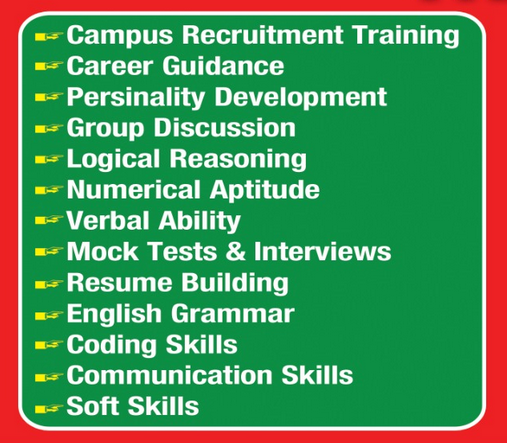Campus recruitment training is crucial for preparing students and recent graduates for the job market. It usually involves several components designed to enhance their employability and increase their chances of securing a job. Here are some key elements often covered in campus recruitment training:
1. **Resume and Cover Letter Writing**:
– **Creating a Strong Resume**: Tips on formatting, highlighting achievements, and tailoring resumes to specific job roles.
– **Crafting an Effective Cover Letter**: Guidance on how to write a compelling cover letter that complements the resume and addresses the employer’s needs.
2. **Interview Preparation**:
– **Interview Techniques**: Training on answering common interview questions, behavioral questions, and situational questions.
– **Mock Interviews**: Conducting practice interviews to build confidence and improve responses.
– **Body Language and Communication Skills**: Emphasizing the importance of non-verbal cues, active listening, and clear communication.
3. **Job Search Strategies**:
– **Networking**: Tips on building and leveraging a professional network, including LinkedIn usage.
– **Job Portals and Application Platforms**: Guidance on using various job search engines and company career portals effectively.
4. **Personal Branding**:
– **Online Presence**: Advice on how to create and maintain a professional online presence, especially on LinkedIn and other social media platforms.
– **Elevator Pitch**: Developing a concise and engaging pitch to introduce oneself in networking situations.
5. **Understanding the Recruitment Process**:
– **Company Research**: How to research potential employers and understand their company culture, values, and job requirements.
– **Assessment Centers**: Insights into what to expect during assessment center exercises, such as group discussions and case studies.
6. **Soft Skills Development**:
– **Time Management**: Techniques for managing time effectively, especially during job searches and interviews.
– **Teamwork and Leadership**: Enhancing skills related to working in teams and demonstrating leadership potential.
7. **Industry-Specific Training**:
– **Sector-Specific Knowledge**: Depending on the industry, there might be additional training on specific skills or knowledge required in that field.
8. **Follow-Up and Negotiation**:
– **Post-Interview Follow-Up**: How to send thank-you notes and follow-up emails professionally.
– **Salary Negotiation**: Strategies for negotiating job offers and understanding compensation packages.
For a successful training program, it’s essential to tailor the content to the specific needs of the students and the industries they are targeting. If you’re involved in organizing or participating in such training, focusing on interactive and practical components can make the sessions more effective and engaging.
